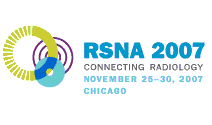
Abstract Archives of the RSNA, 2007
SSE01-01
Arbitration and Consenus in a National Breast Screening Program: Does the End Result Justify the Means?
Scientific Papers
Presented on November 26, 2007
Presented as part of SSE01: Breast Imaging (Mammography)
Colette Shaw MBBCh, Presenter: Nothing to Disclose
Fidelma Flanagan, Abstract Co-Author: Nothing to Disclose
Helen M. Fenlon MBBCh, BAO, Abstract Co-Author: Nothing to Disclose
Michelle Marie McNicholas MD, Abstract Co-Author: Nothing to Disclose
This study assesses the impact of arbitration on recall rates and cancer detection rates in the Irish National Breast Screening Programme (NBSP). It reviews the interval cancers detected in women who were not recalled following arbitration and examines the use of arbitration as an audit tool for readers.
The study population consisted of women who attended the Irish National Breast Screening Program at the Eccles centre for their inital screening mammogram between 2000 and 2005. Mammograms were read independently by two experienced radiologists. A case was referred for arbitration if one reader but not the other recommended recall to assessment. Details relating to these cases and their imaging were reviewed.
Of 128,569 screening studies performed between 2000 and 2005, 1351 cases were discussed at arbitration (1%). Of these, 617 (46%) were recalled for further assessment, resulting in a recall rate of 4.4%.
Seventy-two cases of malignant disease (7.4% of all malignant tumours) were diagnosed in those recalled to assessment following arbitration, increasing the cancer detection rate from 6.90/1000 to 7.46/1000 women screened. 734 cases were assigned to routine recall. Nine of these cases (0.7% of the consensus group) were subsequently diagnosed with malignant disease. If all 1351 cases had been recalled to assessment, the recall rate would have increased from 4.4 to 5% with a potential increase in the cancer detection rate from 7.46/1000 to 7.53/1000 women screened.
In our centre where screening mammograms are read by experienced radiologists, arbitration has resulted in an increase in the number of patients diagnosed with malignant disease (7.4% of all cancers diagnosed), yet has maintained recall rates at an acceptable level of 4.4%. While it increases work-load, it also eliminates referral of cases that do not warrant recall and is justified in not missing a significant number of cancers in the women returned to routine screening following arbitration.
In breast cancer screening, arbitration has an important role to play in maximising the cancer detection rate while keeping the recall rate and the false positive rate within acceptable levels.
Shaw, C,
Flanagan, F,
Fenlon, H,
McNicholas, M,
Arbitration and Consenus in a National Breast Screening Program: Does the End Result Justify the Means?. Radiological Society of North America 2007 Scientific Assembly and Annual Meeting, November 25 - November 30, 2007 ,Chicago IL.
http://archive.rsna.org/2007/5012643.html

